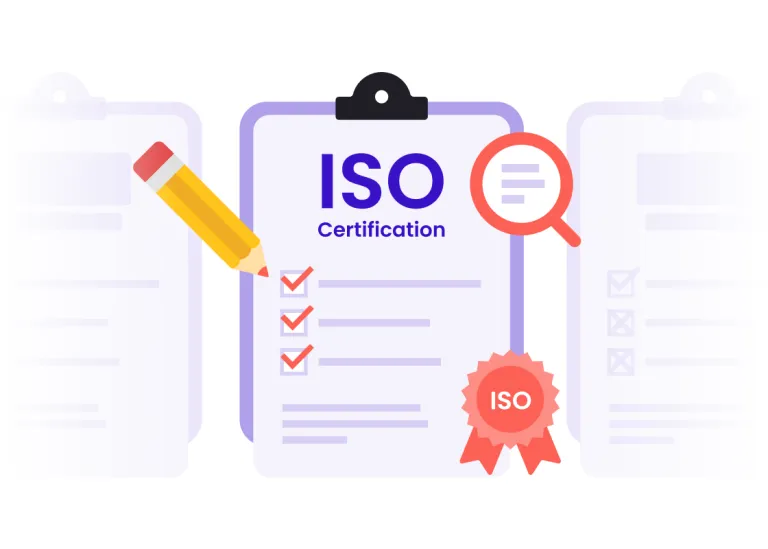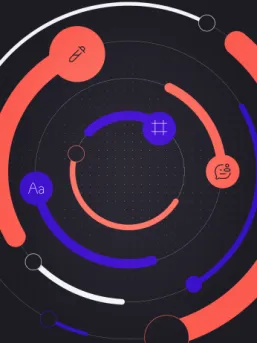What ISO Certifications Tell You About an Agency (and Why It Matters)

Introduction
When you’re choosing a digital agency, it can be difficult to tell the difference between those that say they have strong processes and those that can actually prove it. Every agency talks about quality, security, reliability, and service excellence, but without external verification, how can you know if those claims stand up to scrutiny?
That’s where ISO standards come in.
ISO (International Organisation for Standardisation) frameworks are internationally recognised systems designed to ensure that businesses operate safely, efficiently, and responsibly. They aren’t just pieces of paper or vanity credentials; they are formal certifications that confirm an organisation’s management systems have been independently audited against agreed global best practice.
ISO certifications can only be awarded by independent, UKAS-accredited auditors, who thoroughly assess an organisation’s processes and controls. They don’t rely on self-assessment, peer recognition, or pay-to-join schemes. Instead, ISO certification is evidence-based, not claim-based, a verified measure of whether a business is genuinely operating to the highest recognised standards.
For a digital agency, that means having documented, repeatable, and externally validated processes for everything from information security and business continuity to quality management and environmental sustainability. It means that the agency has put in place the same level of structure and discipline that you would expect from a large-scale, regulated organisation, and that accredited external assessors regularly review this.
In a fast-moving digital landscape where clients place enormous trust in their partners to protect sensitive data, ensure availability, maintain compliance, and deliver reliably, ISO standards are a way to demonstrate that trust isn’t taken for granted. They are frameworks that prove an agency has its foundations in order, that risks are understood and managed, and that improvement is a continuous process rather than a one-time project.
For clients, this means peace of mind, knowing that the agency you’re working with has not only built robust systems behind the scenes but is also committed to maintaining them through constant review and independent oversight.
ISO standards: the collective wisdom of industry
One of the most overlooked aspects of ISO standards is where they come from. They aren’t written by a single regulator or a committee; they are developed through decades of collaboration between global experts, industry leaders, academics, and policymakers. Each standard represents the distilled experience of thousands of specialists who understand what good practice looks like in their respective fields.
That collective wisdom is what makes ISO frameworks so valuable. They take the lessons learned from across industries and turn them into structured, globally recognised systems that any organisation can apply. When an agency implements an ISO standard properly, it’s not reinventing the wheel or relying on its own interpretation of “best practice”. It’s aligning with proven, consensus-driven frameworks that have been refined and tested over time.
In practical terms, this means that an ISO-certified agency is not just following its own internal playbook; it’s benchmarking itself against the same quality and security principles used by major international businesses and public sector organisations. The result is consistency, accountability, and a shared language of assurance that clients can trust.
For Zoocha, adopting ISO standards has meant integrating these global best practices into every aspect of our operations: from data handling and project management to planning for resilience, protecting our environment, and continually improving our work processes. Each certification connects us to a broader ecosystem of expertise, ensuring that our systems evolve in tandem with the latest industry knowledge and best practices.
Without ISO: how do you know what “good” looks like?
When an agency talks about having “robust processes” or “strong governance,” it can sound reassuring, but what does that really mean without a recognised framework behind it? In the absence of ISO standards, there’s no consistent definition of what “good” looks like across areas such as information security, business continuity, or privacy management. Each agency is left to decide for itself what “secure,” “resilient,” or “compliant” means, often based on experience rather than verified criteria.
That uncertainty matters.
Security, continuity, and data protection aren’t optional extras; they’re fundamental to how digital services operate and how trust is built. Without a framework like ISO 27001 (Information Security Management) or ISO 22301 (Business Continuity Management), an agency may have policies in place, but there’s no guarantee that they’re comprehensive, up-to-date, or tested under real-world conditions. It’s easy for these areas to become background concerns, revisited only after something goes wrong.
ISO standards eliminate that ambiguity by setting clear, measurable expectations for what constitutes “good” performance. They require documented processes, risk assessments, and evidence of regular reviews and improvements. They ensure that aspects such as data protection, resilience, and service quality aren’t left to chance or individual interpretation; they’re structured, monitored, and independently validated.
For clients, this means that when you work with an agency that is certified to ISO standards, you don’t have to take their word for it. You can be confident that their systems and practices have been tested (and regularly re-tested) against internationally agreed benchmarks. It’s not about trust alone; it’s about verifiable assurance that the foundations of your digital projects are sound.
External scrutiny: turning promises into proof
Most agencies will tell you they take information security, continuity, and quality seriously, and many genuinely believe they do. The challenge is that belief alone doesn’t guarantee consistency or rigour. Without independent assessment, even the most well-intentioned organisation can fall into complacency, letting critical governance areas drift quietly down the list of priorities.
ISO certification changes that dynamic. It introduces structured external scrutiny; a cycle of regular audits carried out by accredited specialists whose sole purpose is to test whether a company is truly meeting the required standards. These audits go far beyond a checklist exercise. They examine documentation, interview staff, sample evidence, dig into core systems and test whether procedures are not only defined but also embedded in day-to-day operations.
That level of accountability keeps every aspect of a certified organisation under continual review. It ensures that policies are lived, not simply written, and that any gaps are identified and addressed before they become risks. For agencies, it means that claims about security, privacy, quality, or environmental responsibility are backed by verifiable evidence. For clients, it means they don’t have to rely solely on trust.
This independent validation also sends an important signal about culture. An agency willing to open its processes to external inspection is one that values transparency and improvement over convenience. It demonstrates that the business doesn’t just meet expectations once for certification; it continually works to maintain them through ongoing monitoring and refinement.
In short, ISO frameworks turn internal promises into proven performance. They demonstrate that an agency is confident enough in its systems to let an expert look under the bonnet, and disciplined enough to act on what they find.

Commitment to consistency and continual improvement
ISO certifications aren’t one-off achievements. They are built on the principle that organisations must demonstrate consistency in how they work and continual improvement in how they evolve. That combination is what separates agencies that perform well once from those that perform well over time.
For an ISO-certified agency, success is not just about having good processes; it’s about maintaining and refining them year after year. Each certification requires periodic surveillance audits, “internal audits” (confusingly named, as in Zoocha’s case, are undertaken by another 3rd party management system specialist), and documented evidence that improvements are being made. This means that quality, security, and service management are not static targets; they are ongoing disciplines woven into the fabric of everyday operations.
At Zoocha, this commitment is evident in how we deliver projects, manage risks, respond to incidents, and address feedback. Every process, from code review to incident response, is documented, reviewed, measured, and improved in line with our ISO frameworks. When an issue arises, we don’t just fix it; we record it, analyse the cause, and adjust the system to prevent it from happening again.
For clients, this translates into reliability and predictability. You can expect the same level of professionalism, documentation, and rigour whether you’re engaging Zoocha for a small enhancement or a complex digital transformation. It also means that as standards evolve, whether through technological change, new regulations, or industry best practice, Zoocha evolves too.
ISO standards require proof that a business learns and adapts to changing conditions. That culture of continual improvement creates lasting value: it builds resilience, drives innovation, and ensures that our work today is stronger than it was yesterday.
Each ISO certification that Zoocha holds represents a different dimension of quality, governance, and assurance. Collectively, they form a framework that gives clients confidence that their projects are being delivered securely, consistently, and sustainably. Here’s what each ISO certification that Zoocha holds means in practical terms:
| Standard | What it covers | What it means for Zoocha clients |
ISO 9001 - Quality Management | Defines how we manage quality across our services, from planning and delivery to client feedback and continuous improvement. | You can expect consistent delivery, clear communication, and a focus on measurable outcomes. It ensures that every project follows a structured, well-documented process and that improvements are actively tracked. |
ISO 27001 - Information Security Management | Sets the framework for protecting sensitive information, managing risk, and responding to security threats. | Your data, systems, and digital assets are safeguarded through audited processes for access control, encryption, monitoring, and incident management. Security is not just a promise; it’s a certified practice. |
ISO 27701 - Privacy Information Management | Extends ISO 27001 to cover privacy, personal data, and GDPR compliance. | You can be confident that any personal data shared with Zoocha, from user information to analytics, is handled in line with international privacy standards and legal obligations. |
ISO 22301 - Business Continuity Management | Ensures that the organisation can continue operating effectively in the event of unexpected disruptions. | You have assurance that services will remain available and recover quickly in the event of incidents such as infrastructure failures, cyberattacks, or natural disasters. |
ISO 20000 - IT Service Management | Defines best practice for service delivery and support processes, from incident handling to change management. | This certification formalises Zoocha’s service management processes, ensuring that every aspect of service delivery follows a structured, measurable framework. |
ISO 14001 - Environmental Management | Focuses on reducing environmental impact and improving sustainability. | Working with Zoocha means partnering with an agency that actively minimises its environmental footprint, from office operations to cloud hosting, and contributes to sustainability goals. |
Our ISO journey doesn’t stop here. As technology, regulation, and client expectations continue to evolve, so too must the frameworks that underpin our operations. Zoocha is already exploring the next stages of this progression, including ISO 42001 for Artificial Intelligence Management, which will help ensure that emerging AI tools are deployed in an ethical, transparent, and responsible manner. We are also evaluating ISO 56000 for Innovation Management to formalise how we foster creativity, experimentation, and continuous improvement across teams. Additionally, we are exploring the potential to extend existing scopes through standards such as ISO 27017 (cloud service security) and ISO 27018 (protection of personal data in the cloud), thereby reinforcing our commitment to security and privacy in modern hosting environments. Each of these represents another step in a long-term commitment, not to collect badges, but to keep strengthening the systems that make Zoocha a trusted, resilient, and forward-looking digital partner.
An important point to note about ISO certifications is that they don’t exist in isolation. In our case, they work together as a single, integrated Business Management System (BMS), which is audited across all departments and functions. This structure ensures that quality, security, continuity, privacy, and sustainability are all managed through aligned processes rather than separate silos.
For clients, that integration translates into tangible benefits: lower risk, higher consistency, and a trusted partnership built on accountability. It means every project is delivered within a framework that meets and is regularly tested against the same standards followed by global enterprises and public sector organisations.
The real-world benefits of ISO certification
For most clients, ISO certifications may seem like background details, a line in a proposal, a badge on a website, or a logo in a footer. In reality, they are one of the clearest indicators of how seriously an agency takes its responsibilities.
When you partner with an ISO-certified agency, you’re choosing a supplier that operates within a proven framework for excellence. Every project, policy, and process is built around structured assurance: quality management, data protection, service reliability, environmental responsibility, and resilience under pressure. These aren’t optional extras; they’re woven into how the agency functions.
Here’s what that means in practice:
- Reduced risk: Your agency partners' systems are externally validated to identify and manage risks before they become problems.
- Stronger governance: There’s traceability, documentation, and accountability behind every key process.
- Consistent delivery: Whether it’s a small change request or a multi-year transformation, work is carried out within the same disciplined structure.
- Regulatory assurance: You can demonstrate due diligence in areas like data protection, accessibility, and sustainability by partnering with a certified supplier.
- Continuous improvement: The agency is required to learn from every audit, incident, and project outcome, meaning its systems evolve in line with best practice.
In contrast, when a supplier doesn’t work within a recognised framework, clients must take a lot on trust. Claims about security, quality, or continuity may be well-intentioned, but without external verification, there’s no objective evidence to confirm that those standards are consistently met.
ISO certifications close that gap. They provide a layer of independent assurance that complements your own due diligence, making it easier to justify procurement decisions, protect organisational interests, and maintain compliance.
Ultimately, clients should care because ISO certification isn’t about ticking boxes; it’s about knowing that your digital partner has been tested, validated, and held to the same international standards as the most trusted organisations in the world.
Choosing an agency you can trust
When you appoint a digital agency, you’re not just buying a service; you’re placing trust in another organisation to handle sensitive data, manage critical systems, and deliver work that reflects your brand and reputation. That trust should be earned, not assumed.
ISO certifications provide the clearest proof that an agency takes that responsibility seriously. They demonstrate that the business has established a culture of accountability, operates under independent scrutiny, and maintains a continuous cycle of improvement. In other words, it’s not simply saying “we do things properly”; it’s demonstrating that it has been verified, measured, and tested against global standards.
At Zoocha, as mentioned earlier, our ISO certifications form part of a single, integrated management system that covers quality, information security, privacy, business continuity, service management, and environmental impact. These aren’t separate badges; they are interlinked disciplines that shape how we plan, deliver, and support every project.
For clients, this means confidence that the essentials of security, reliability, transparency, and sustainability are built into every engagement from the start. It means projects are delivered with consistency, decisions are evidence-based, and risks are proactively managed rather than reactively addressed.
Conclusion: standards that build trust
At Zoocha, ISO standards have become an integral part of who we are; we view our ISO certifications as commitments, not just credentials. They underpin the trust our clients place in us and the trust we place in our people, ensuring that every project, large or small, is delivered with structure, integrity, and confidence that stands up to scrutiny.
We achieved our first certifications, ISO 9001 for Quality Management and ISO 27001 for Information Security, in 2017, following several years of preparation and investment in building the right systems, culture, and mindset. Since then, we’ve added further certifications across privacy, business continuity, service management, and environmental sustainability. Looking back, it’s hard to imagine operating without them.
Before we became certified, we thought our processes were strong, and they were, to a certain extent. However, ISO introduced structure, discipline, and external validation that transformed how we work. It gave us a framework to test our assumptions, identify risks early, and measure improvement over time. That rigour has shaped our culture: today, every project, audit, and client engagement is grounded in those same principles of accountability and continuous improvement.
Holding ISO certifications isn’t just a box-ticking exercise for us; it’s a core part of how we deliver trust. It means that quality, security, and resilience aren’t left to chance or interpretation; they’re embedded, monitored, and independently verified. It’s how we ensure that every client benefits from the same level of consistency and care, regardless of their scale or complexity.
After nearly a decade of living within these frameworks, we wouldn’t go back. The transparency, confidence, and shared understanding that ISO brings, both internally and with our clients, have become essential to our operations. For us, the real value of ISO isn’t in the certificates on the wall, but in the culture of reliability and trust that they’ve helped to build.
About the author
David Pratt is the Chief Technology Officer at Zoocha, where he helps organisations build secure, scalable digital platforms that stand the test of time. A long time member of the Drupal community, David is passionate about open source collaboration and has contributed to Drupal’s growth through code, mentoring, and community leadership. When he’s not shaping technical strategy or exploring the next wave of digital innovation, you’ll probably find him geeking out over new ideas that make the web a better place.





